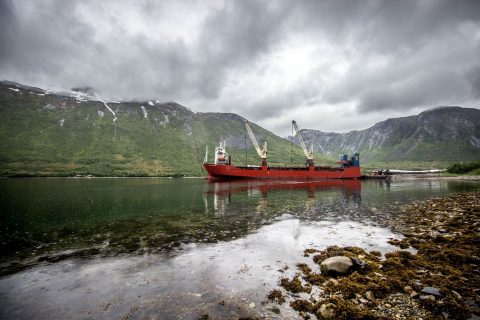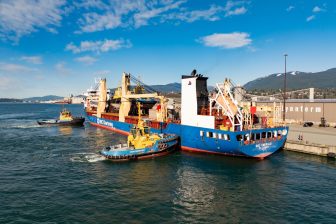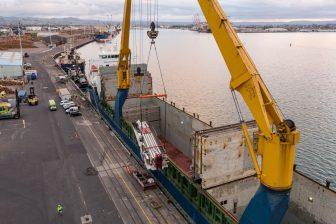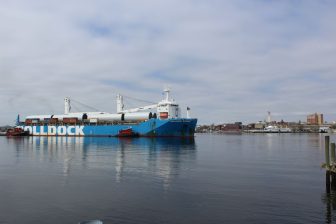
2023 in Review: Interviews of the year
As we leave the year 2023 behind, it is worth reminding everyone of the articles that got the most attention, the interviews of the year and the Editor’s picks. The Project Cargo Journal team wishes everyone a happy and prosperous 2024.
Published on January 17
More women enter the breakbulk sector, despite prevailing prejudice
Breakbulk and project cargo shipping is a male-dominated industry, there is no two ways about it. However, over the recent years, women have staked their claim. “Things have changed, especially over the last decade,” says Beliz Ates, customer relations specialist at DP World.
“We regularly meet more women working in different roles of the business, like agencies, logistics, chartering, cargo owners of shipowners in Türkiye,” says Ates who is focusing on breakbulk and general cargo at the DP World Yarimca, one of the largest container terminals of İzmit Gulf and Türkiye.
Published on February 17
“Slicing the cake”: Diversification in the Port of Cleveland
Project cargo is on the rise throughout the Great Lakes, in the United States (US). Dave Gutheil, chief commercial officer at the Cleveland-Cuyahoga Port Authority since 2018, discusses recent trends, developments and challenges in the port.
“We also see frequent barge movements to and from various ports within the Great Lakes between the U.S. and Canada. Periodically, we also have heavy lift international vessels that come through the seaway, and their cargo gets transhipped to a barge going either upriver here in northeast Ohio or to some other ports on the Great Lakes,” he adds.
Published on March 29
Less assembly on site mean transporting project cargo on the limit of technical possibilities
Over the last couple of years, a number of trends could be observed, with a shift in the supply chains being one and the fluctuations in freight rates being the obvious other. Comments from within the industry were that sourcing for projects has changed significantly with developers sourcing closer to development sites or sourcing from multiple locations to ensure project cargo gets delivered rather than opting for a cheaper option.
Speaking to Project Cargo Journal, Franco Ravazzolo, head of project & break bulk at Gebrüder Weiss, confirmed the shift adding that there is also an increase in imports to Europe and a growing demand for cross trades, i.e. for project transports where loading and receiving points take place outside the country in which the customer is based. In addition, transport decisions are increasingly being made outside Europe.
Published on June 27
Supply chain is not ready for ambitious targets, not even close
Energy transition efforts have intensified across the globe and governments have set ambitious targets, seemingly without asking the question, who will execute them all? European Commission notes that the installed offshore wind capacity in the EU was 14.6 GW in 2021 and is set to increase by at least 25 times by 2030.
Kasper Heiselberg, Head of Global Wind Renewable Energy at deugro, says that the ambitions are too high. “The supply chain is not ready, not at all. All the big ambitions are not going to materialise,” he said.
However, on the other hand, Heiselberg notes that a positive side of this ambition is that everything is going to be fully booked. “Everyone up and down the supply chain is investing in more production facilities, because they can see that the demand is there,” he says.
Published on August 8
Is there enough space in the supply chain for everyone?
Energy transition goals are plenty, all requiring ample capacity of the global supply chains to meet the demands of projects in development. With the offshore wind sector growing exponentially, the majority of the fleet needed to transport all the components will be a scarce resource.
However, solar and offshore wind are not the sole solution on the path to net zero emissions. Resurgence from the Carbon Capture and Storage could ask some more questions of the supply chain. With the demand from offshore wind, additional requests from CCS and the likes of hydrogen and ammonia, will only exacerbate the issues, or will they?
Published on August 28
How do you operate within the box of restrictions and limited availability?
The Caspian region has always been known for its abundance of oil and gas, and the logistics service providers have delivered loads of project cargo to sites across the likes of Azerbaijan or Georgia. However, the conflict in Ukraine has put significant stress on the region’s infrastructure, as transit routes changed and traffic to the Central Asian countries increased.
“This middle corridor became very active since the conflict in Ukraine started and sanctions on Russia were added on top of the existing sanctions against Iran,” says Azer Aliyev, Regional Director CIS and Caspian Sea at Trans Global Projects (TGP).
Published on August 24
There is nothing women can’t do in project logistics
Is there a job women can’t do? “No!, That’s a silly question,” answers Ashleigh Swartz, Director, at Trans Global Project (TGP). “You can do anything you put your mind to,” she added.
However, it is not without challenges, maybe even more so for women in a male-dominated industry. There are still situations in which women face challenges, but there is change. “I am proud to be paving the way forward for women in logistics, especially in a leadership role. I am optimistic that TGP will see more female directors as the next generation comes up,” Swartz added.
Published on August 29
AAL testing, expanding and targeting large projects with its Super B newbuilds
The market has sort of normalised over the last two years, the multipurpose sector has gone through a correction, which is reflected in the charter rates. Recently it has been more business as usual for the heavy-lift MPP specialist AAL.
“Utilisation is still quite high. However, we are seeing a change in demand – not so much in whether ships are full, but rather in the lead time to fix those cargoes,” Christophe Grammare, managing director at AAL, told Project Cargo Journal. “Last year, vessels were fully booked six months in advance, now it is down to two months.”
Published on September 5
Project logistics are getting a lot more attention
The logistics industry is thriving currently after experiencing a challenging period that lasted for three years. During this time, the supply chain has become more important in companies’ strategies due to the realization of its critical role and impact on the entire business. This was not previously recognised, Global Senior Director of Energy at GEODIS, Amanda Bouin said.
“So as a result, there is a lot more attention being paid to logistics and the whole supply chain, which in a way is good. It means it has been recognised for what it is worth and the impact it can have on the project that our clients are working on,” Bouin said.
You just read one of our premium articles free of charge
Register now to keep reading premium articles.




